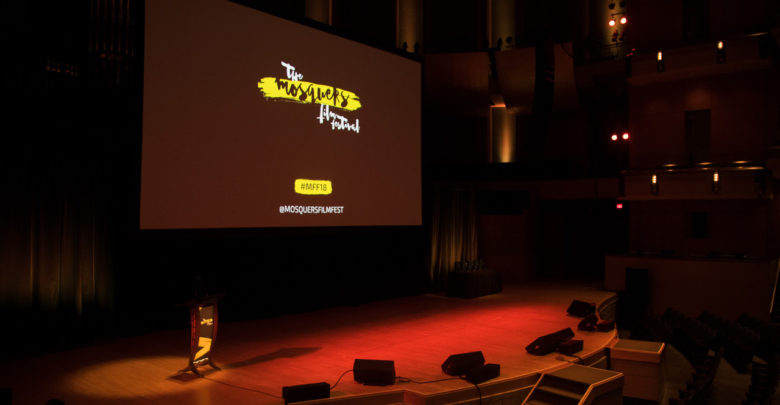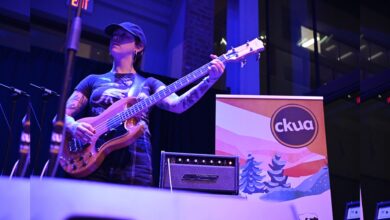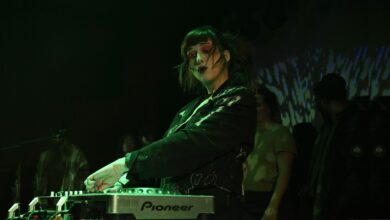Q&A: The Mosquers Film Festival 2022
The Mosquers Film Festival invites people of all backgrounds to come and enjoy an a night of films highlighting Muslim creators!
 Supplied
SuppliedThe Mosquers Film Festival is a film festival that occurs annually, hoping to combat misconceptions about Muslim people and Islam through showcasing the talent of Edmonton’s Muslim community.
Started in 2007, the festival has gone strong since, only pausing briefly due to the limitations of the COVID-19 pandemic; this year, the festival is back and ready to welcome everyone back to an even better viewing experience. This year, the Mosquers Film Festival will be happening on March 12, with doors opening at 6:00 p.m.. The Mosquers Film Festival is for everyone, as it’s a celebration of diversity.
Zeina Ebeid, the festival’s creatives and space coordinator and a University of Alberta alumni, noted that although most of the festival’s attendees are Muslim, non-Muslims are encouraged to attend.
Responses have been edited for brevity and clarity.
The Gateway: How would you describe the Mosquers Film Festival in your own words?
Ebeid: We’re a short film festival that showcases the diversity and the talent of the Muslim community. We aim to provide a channel for talented individuals to be able to express themselves and combat misconceptions of Islam through art. Oftentimes, Muslims aren’t really integrated into the film and arts scene, and when they are, they’re usually misrepresented or underrepresented so it’s good to have a platform where these creatives can express themselves through art.
Q: How would you say the films this year highlight the diversity of and show insight into Edmonton’s Muslim community?
Every year we do have two different sections in the film festival — we have films that are submitted globally, and then we have a specific section for local film submissions. This year we did get a lot of local films that talked about [their experiences.] Either their mental health while being Muslim, their experience growing up as a Muslim here — you never really know what you’re going to get because people often have a different story they want to share. Not everyone has the same story being Muslim or being a creative or minority in Edmonton. I hope what we can display at the film [festival] can give insight into Edmonton’s Muslim community specifically through the local films.
Q: How has the film festivals, or how have you seen filmmakers respond to the COVID-19 pandemic, and how has it shaped the festival?
We did have to put the festival [on] pause because of the pandemic for a few years now, and I think that because it’s been paused for a couple years, we’ve been able to get people more excited to come. A lot more people are excited, and as it grows, a lot more people are connecting within themselves too. A lot of people who have never worked together before are starting to create films together.
Q: What would you like to highlight about this year’s film festival?
This year’s a bit different because it’s the first time we’ve ever had a multi-day event. We’re starting off the festival weekend with an invite-only panel discussion that’s going to happen this Friday. It’s going to give an opportunity to creators specifically who might not be able to connect as much at the film festival because it is more of a viewing-style [experience]. This is strictly a discussion, where they can talk to panellists who are a bit more developed in the realm [of filmmaking] and mingle amongst themselves. I think it’s really cool and I hope it’s a day we can keep hosting for future years.
Q: Why do you think a festival like Mosquers is so important to have?
The thing with how minorities are represented in media [is] if we’re represented, we’re often not represented correctly — and I think that’s just the case because we don’t have a lot of Muslims who are telling their own story. You might have a person who isn’t a Muslim and they might tell their version a version of that story, and a lot of times we’re not highlighted in the most positive light or we’re misrepresented, or a tiny aspect of our culture is represented on a very popular film or a movie, and people just think that’s how it is with everyone, but that’s just not the case. I think that if more Muslims are integrated and are able to work alongside people who aren’t Muslims, we can definitely reframe the conversation that’s happening when you represent Muslims in film and media.
Q: What do you hope visitors to the film festival take away from their experience?
Hopefully that they can try to understand the vision of these creators, either be inspired, or if you’re not into the artistic side and you just want to see a good film, want to see people as they progress through their artistic endeavours and their careers, the biggest takeaway is that we’re not all that different.
Hey, you don’t have to be Muslim to enjoy a film.
Check out the Mosquers Film Festival on their website.




